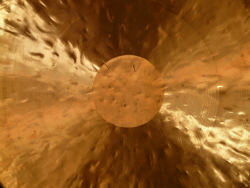Preparing for the Gong: Some Great Books
creating a framework for spontaneity
It's the great paradox. "The harder I work, the luckier I seem to get." No one seems to know who was the first person to say that, but it rings true. Likewise: "The muse is more likely to show up if you sit at your desk ready for her."
Likewise, when you're not depleted and deprived, you're better able to respond to emergencies.
When in tune with the cycles going on around you, and when you create your own cycles, you're laying the groundwork for liftoff. If you know what your goals are, you'll see your way clearer toward achieving them. If you don't know what they are, you'll see clearer toward identifying them.
That's what the 100-day Gong is for. Here are some resources that will help. (Edited once, and likely to be edited more as people suggest to me resources that have worked for them.)
Starting right here, I've already offered three posts about the gong: related to the concept of doing more of what you love, and then on the Solstice as a good time to start such a practice, and then about the gong itself, including a collection of online resources.
There are a few books that I think are particularly helpful both when setting up a Gong and as part of the framework of a regular practice.
A wonderful book I just came across recently, although it's not a new book, is Michael Gelb's How to Think Like Leonardo da Vinci: Seven Steps to Genius Every Day . This book has a winning formula to be both inspiring and useful in the context of a gong (or elsewhere):
- It inspires and holds the reader's attention through story, both Leonardo's and others.
- It makes clear why creativity, and appreciation of beauty, are desirable.
- It makes a convincing case that creativity and the balancing of left and right brain are in everyone's reach.
- It provides suggestions for how to experience this creativity and balance, holding these suggestions within story so the reader can relate.
- It provides a detailed, practical framework and tools for how to foster these practices, both as an individual and as a family or a team of workers.
I found the book a delightful read just straight through, but I'll be using at least some of the suggestions and exercises as part of my gong. Practices aimed at strengthening all aspects of creativity mesh well with the aim of a gong, the interplay of discipline and spontaneity. Bringing an element of play into that space is just like the little spark of light at the year's dark solstice.
This book also provides my synchronicity of the week: Gelb spends a significant amount of time on mind mapping, a concept I've been running into all over the place in my life lately, and which I'm using to figure out how to set up my gong.
Another old favorite for giving the inner artist room to play while setting up practice and discipline is Julia Cameron's The Artist's Way. The "morning pages" practice she suggests have become so ubiquitous that there are people who do them religiously while never having read the book!
The hardest assignment she sets, for me and for most people I've asked, is the "artist's date," where you take yourself out once a week on a trip somewhere to treat your inner artist. A gallery or museum, or a coffee shop with art exhibits, or a toy store, or a park...So many possibilities, so hard to cut loose and do it! Hmmm. Maybe that needs to go in my Gong this time.
A book others have found very valuable in creating practices for their gong is Hal Elrod's The Miracle Morning: The Not-So-Obvious Secret Guaranteed to Transform Your Life (Before 8AM) . As the title suggests, this book details through story and practical steps how a solid, multipronged morning routine can make the rest of the day go beautifully.
A couple more recommendations:
- Joe Vitale's Zero Limits: The Secret Hawaiian System for Wealth, Health, Peace, and More
on creation through love, and the melding of spirituality with goal setting
- Robert Greene'sMastery
(already discussed here) -- inspiration through story
- Cheryl Richardson'sLife Makeovers: 52 Practical & Inspiring Ways to Improve Your Life One Week at a Time
--how do you want your life to look; practical steps.
- Wayne Dyer's meditations on the Tao Teh Ching, Change Your Thoughts - Change Your Life: Living the Wisdom of the Tao
is a great practical and spiritual guide one can choose for a cyc lic practice,
- Another gem of a text for cyclic practice is Prayers of the Cosmos: Meditations on the Aramaic Words of Jesus
, Neil Douglas-Klotz's presentation of the Lord's Prayer from the Aramaic tradition, meditating on each line to the essence of the sound of each syllable, showing the many possible translations, each of which is like a medicine.
- I have loved having a desktop affirmation calendar (from Louise Hay). It's a small gift every day, to peel off yesterday's and find a new beautiful image and affirmation. A lovely reminder anytime, great when building positive habits and attitude.
Community carefully chosen can be key to a successful gong. Accountability, understanding, advice, moral support, sharing of resources... I'd love to hear other people's suggestions for inspiring reading and practice guidance--please share! (And the post now reflects suggestions from others--keep 'em coming.)
About the Author
Ela Harrison
Ela is a wordsmith and herb lover who has lived in many places and currently resides in Tucson, AZ.
